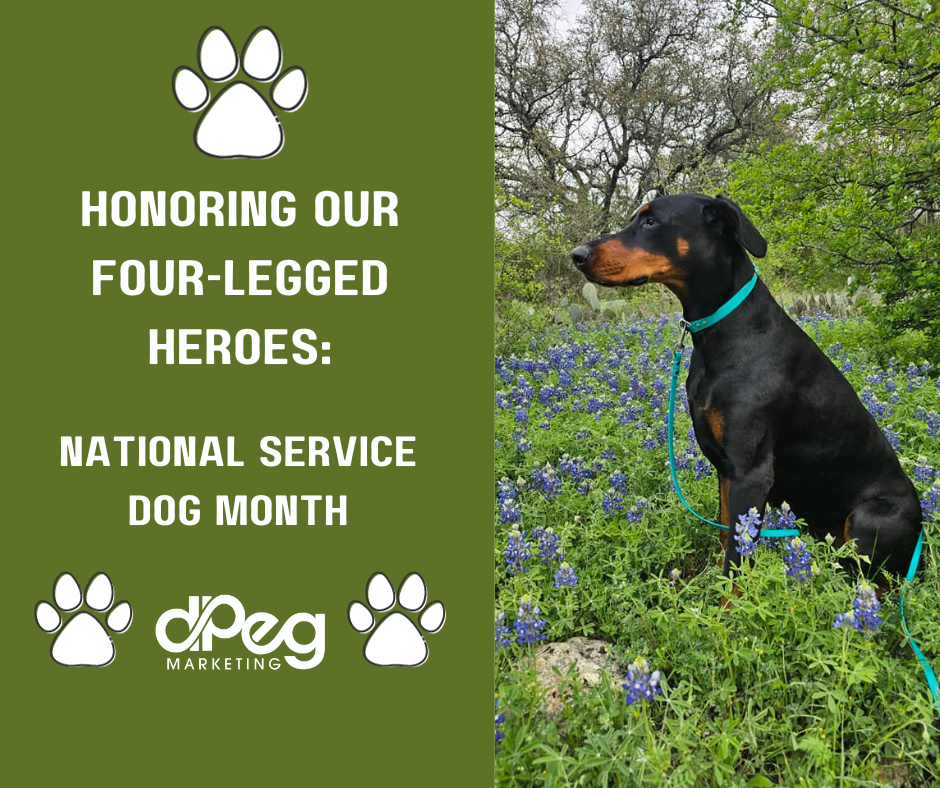I can’t believe we almost let September pass us by without acknowledging National Service Dog Month. We love our animal companions, but Teona’s Doberman Amira is more than just a companion. She’s a trained service dog and gives Teona the balance, support, and confidence she needs to travel for dpeg Marketing. Service dogs perform essential roles for individuals with disabilities, so we wanted to celebrate them in this blog post.
The History of Service Dogs
When I was a kid, back in the 80s, the neighbors across the street had a golden retriever in a program to become a guide dog for the visually impaired. I think her name might have been Daisy. She was the sweetest dog in the world and eventually left their home to complete the program. I was glad I got to experience part of her development when I was little.
Over the years, the roles of service dogs have expanded.
As the understanding of canine capabilities grew, so did the recognition of their potential to aid people with various disabilities. Today, service dogs support individuals with physical disabilities, hearing impairments, and those with psychiatric conditions like PTSD. Today, service dogs play crucial roles in helping people with a multitude of disabilities, making them indispensable companions and allies in improving the quality of life for their human partners.
Types of Service Dogs
Service dogs are vital in assisting individuals with a wide range of disabilities. Here are some of the various roles that service dogs fulfill.
Guide Dogs
Guide dogs, also known as seeing-eye dogs, assist people with visual impairments in navigating their surroundings. They help their handlers avoid obstacles, cross streets safely and find specific destinations.
Mobility Assistance Dogs
These dogs aid individuals with mobility impairments by performing tasks such as retrieving objects, opening doors, turning on lights, and providing balance and stability while walking.
Hearing Dogs
Hearing dogs assist individuals who are deaf or hard of hearing by alerting them to important sounds like doorbells, alarms, or a person’s name being called. They provide valuable cues to enhance their handler’s safety and awareness.
Medical Alert Dogs
These dogs are trained to detect changes in their handler’s body odor or behavior that may indicate a medical issue, such as a seizure, low blood sugar in diabetics, or an impending panic attack. They can alert their handlers or fetch medical supplies.
Psychiatric Service Dogs
These dogs support individuals with psychiatric conditions like post-traumatic stress disorder (PTSD), anxiety, or depression. They can provide comfort, reduce anxiety, interrupt harmful behaviors, and create a sense of security for their handlers.
Autism Support Dogs
These dogs assist individuals on the autism spectrum by providing emotional support, reducing sensory overload, and promoting social interactions. They can be especially beneficial for children with autism.
Seizure Response Dogs
Trained to respond during and after seizures, they can protect their handler during an episode, fetch help, or activate alert systems. They provide crucial assistance to individuals with epilepsy.
Allergy Detection Dogs
Individuals with severe allergies may benefit from allergy detection dogs that can identify allergens like peanuts, gluten, or specific medications, ensuring their safety in various environments.
Diabetic Alert Dogs
These dogs are trained to detect changes in blood sugar levels and alert their handlers, allowing them to take necessary measures to manage their diabetes.
Wheelchair Assistance Dogs
Specifically trained for individuals who use wheelchairs, these dogs can perform tasks like picking up dropped items, pushing buttons, and providing companionship.
These roles demonstrate the incredible versatility and assistance that service dogs provide, tailored to the specific needs of their handlers, ultimately enhancing their independence and overall quality of life.
Impact on Individuals
I know from traveling with Teona and Amira that service dogs are extremely valuable. It’s partly because of Amira that Teona can travel to meet with clients around the county. Amira provides stability and assistance for Teona as she navigates farms and stables with footing better suited for horses than people. I’ve seen this firsthand, and I know the positive impact service dogs have on their people.
Service Dog Etiquette
Those without service dog experience need to know how to interact with dogs we come across in public settings respectfully.
Do Not Pet Without Permission
The most crucial rule is to never pet or interact with a service dog without explicit permission from the handler. These dogs are working and must remain focused on their tasks. Approaching or distracting them can disrupt their handler’s safety or well-being.
Avoid Distractions
Service dogs are trained to maintain concentration, whether guiding their handler, alerting to medical issues, or assisting with mobility. Avoid any actions that might distract the dog, such as making loud noises, sudden movements, or trying to engage in play.
Respect Personal Space
Give the service dog and its handler ample space to move comfortably. Do not crowd them or walk too closely. Maintain a reasonable distance to avoid unintentionally interfering with their work.
Refrain from Staring or Pointing
Staring at a service dog or pointing can make the handler uncomfortable. Treat them with the same courtesy you would extend to any other person.
Ask Permission for Questions
If you have questions about the dog or the handler’s disability, asking for permission before inquiring is polite. Respect their privacy and boundaries; some handlers may not wish to discuss their condition.
Control Your Pets
If you have a pet with you, ensure it is under control and on a leash. Uncontrolled dogs can be a distraction or cause stress to the service dog.
Offer Assistance Only If Asked
While offering help is well-intentioned, do so only if the handler asks for assistance. Many service dog handlers are highly independent and capable of managing independently.
Understand Different Types of Service Dogs
Not all service dogs are guide dogs for the visually impaired. There are various roles, as mentioned earlier. Be aware that a person’s disability may not be visible, and the service dog’s purpose may not always be obvious.
Follow Access Laws
Be aware of local laws and regulations regarding service dogs. In many places, service dogs are allowed access to public spaces, including restaurants, stores, and public transportation. Businesses and establishments are required by law to accommodate service dogs and their handlers.
It’s important to note that, legally, service dogs are distinct from emotional support animals and have different rights under the ADA. The dogs trained to provide the specific roles described above, can access any public space. Emotional support animals have gained popularity in recent years but are not supported under the ADA. In most cases, those animals are only given special access to housing and travel but not a carte blanche for public access.
Happy National Service Dog Month!
Celebrate service dogs you know in the comments.
Do You Have an Animal Who Could Be a Star?
dpeg Marketing Company has 1 spot open for website design in 2023. Schedule a consultation with us now to start planning for 2024.
We partner with tiny house, agriculture, outdoor, brewing, pet, and equine businesses to help them grow. We can help you optimize your site and integrate the essential tools. You can build your reputation and be recognizable with the right systems.
Contact us for a FREE consultation by emailing teona@dpegmarketing.com or calling (828) 333-3816.











